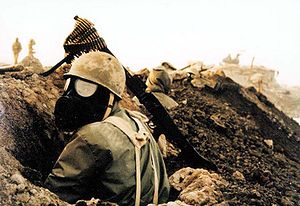ഇറാൻ-ഇറാഖ് യുദ്ധം
ഇറാനും ഇറാഖും തമ്മിൽ 1980 സെപ്റ്റംബർ 2ന് ആരംഭിച്ച എട്ടുവർഷം നീണ്ട യുദ്ധമായിരുന്നു ഇറാൻ-ഇറാഖ് യുദ്ധം. 1988 ഓഗസ്റ്റ് 20ന് യുദ്ധം അവസാനിച്ചു. മുൻപ് നടത്തിയ കരാർ പ്രകാരം ഇറാന് വിട്ടു കൊടുത്ത പ്രദേശങ്ങൾ തിരികെ വേണം എന്ന് സദ്ദാം ഹുസൈൻ ആവശ്യപ്പെട്ടതാണ് യുദ്ധകാരണം. എങ്കിലും ഇറാനിൽ ഉണ്ടായ ഷിയാ വിപ്ലവം അറബ് ലോകത്തേക്ക് പടരാതിരിക്കാൻ അമേരിക്കൻ പിന്തുണയോടെ അറബ് രാജ്യങ്ങൾ ഇറാഖിനെ മുൻ നിർത്തി നടത്തിയ യുദ്ധമാണിതെന്നും ആരോപിക്കപ്പെടുന്നുണ്ട്.
| Iran–Iraq War | |||||||||
|---|---|---|---|---|---|---|---|---|---|
| the Persian Gulf Conflicts ഭാഗം | |||||||||
 Iranian soldier with gas mask and an MG3 in the battlefield | |||||||||
| |||||||||
| യുദ്ധത്തിൽ ഏർപ്പെട്ടിരിക്കുന്നവർ | |||||||||
Support:
|
| ||||||||
| പടനായകരും മറ്റു നേതാക്കളും | |||||||||
| Ruhollah Khomeini (Supreme Leader of Iran) Others:
| Saddam Hussein (President of Iraq) Others:
| ||||||||
| Units involved | |||||||||
| Iranian Armed Forces | Iraqi Armed Forces | ||||||||
| ശക്തി | |||||||||
| At the onset of the war: 110,000–150,000 soldiers, 1,700–2,100 tanks,[13] 1,000 armoured vehicles, 1,100 artillery pieces,[14] 320 aircraft, 750 helicopters After Iraq withdrew from Iran in 1982: 350,000 soldiers, 700 tanks, 2,700 armoured vehicles, 400 artillery pieces, 350 aircraft, 700 helicopters At the end of the war: 900,000 soldiers, 2,500,000 militia, 400 tanks, 800 armoured vehicles, 600 artillery pieces, 60–80 aircraft, 70–90 helicopters | At the onset of the war: 200,000 soldiers, 2,500 tanks, 2,000 armoured vehicles, 800 artillery pieces, 330 aircraft, 350 helicopters After Iraq withdrew from Iran in 1982: 175,000 soldiers, 1,200 tanks, 2,300 armoured vehicles, 400 artillery pieces, 450 aircraft, 180 helicopters At the end of the war: 1,500,000 soldiers,[അവലംബം ആവശ്യമാണ്] 5,500–6,700 tanks, 8,500–10,000 armoured vehicles, 6,000–12,000 artillery pieces, 950 aircraft, 1,000 helicopters | ||||||||
| നാശനഷ്ടങ്ങൾ | |||||||||
| 123,220–160,000 KIA and 60,711 MIA (Iranian claim)[15][16] 200,000–600,000 killed (other estimates)[15][17][18][19][20][21][22][23][24] 800,000 killed (Iraqi claim)[15] 1,000,000+ killed (other estimates)[25] 320,000–500,000 WIA[18][26][27] | 105,000–375,000 killed[15][26][28][29][30] 250,000–500,000 (other estimates)[25] 400,000 WIA[29] Economic loss of $561 billion[15][17] | ||||||||
| 100,000+ civilians killed on both sides[31] (not including 182,000 civilians killed in the Al-Anfal Campaign)[32] | |||||||||
| ¹ The exact number of Iraqi Shia that fought alongside Iran is unknown. The Iraqi political parties SCIRI and Islamic Da'wa Party supported Iran during the war. Iran would sometimes organise divisions of Iraqi POWs to fight against Iraq. | |||||||||

അവലംബം
🔥 Top keywords: മലയാളംമലയാള മനോരമ ദിനപ്പത്രംപ്രധാന താൾകൊൽക്കത്ത നൈറ്റ് റൈഡേർസ്കേരളത്തിലെ ലോകസഭാമണ്ഡലങ്ങൾറിയൽ മാഡ്രിഡ് സി.എഫ്പ്രത്യേകം:അന്വേഷണംമലയാളം അക്ഷരമാലആടുജീവിതംമാഞ്ചസ്റ്റർ സിറ്റി എഫ്.സി.വിഷുരാമനവമികുമാരനാശാൻമനോജ് കെ. ജയൻ2023-ൽ പുറത്തിറങ്ങിയ മലയാളചലച്ചിത്രങ്ങളുടെ പട്ടികഇന്ത്യയിലെ സംസ്ഥാനങ്ങളും കേന്ദ്രഭരണപ്രദേശങ്ങളുംതൃശൂർ പൂരംആടുജീവിതം (ചലച്ചിത്രം)തുഞ്ചത്തെഴുത്തച്ഛൻപ്രേമലുകാലാവസ്ഥമമിത ബൈജുലോക ബാങ്ക്ന്യൂനമർദ്ദംകേരളംകേരളത്തിലെ തുമ്പികൾവൈക്കം മുഹമ്മദ് ബഷീർലോകാരോഗ്യദിനംസന്ദീപ് വാര്യർപാരീസ് സെന്റ് ജെർമെയ്ൻ എഫ്.സി.നസ്ലെൻ കെ. ഗഫൂർസുൽത്താൻ ബത്തേരിലോക്സഭഇന്ത്യയുടെ ഭരണഘടനഇല്യൂമിനേറ്റിലൈംഗികബന്ധംമഴഇന്ത്യൻ തിരഞ്ഞെടുപ്പ് കമ്മീഷൻഎഫ്. സി. ബയേൺ മ്യൂണിക്ക്